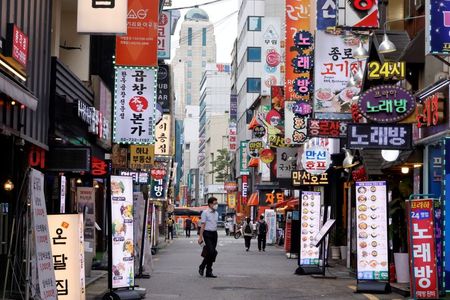By Cynthia Kim and Joori Roh
SEOUL (Reuters) – South Korea’s central bank kept its monetary settings unchanged on Thursday, as expected, but gave strong indications an end to its run of pandemic era record-low interest rates was coming as price pressures build.
Even as the country battles its worst outbreak of coronavirus, Governor Lee Ju-yeol maintained his earlier hawkish tone and pushed up the bank’s inflation projection after keeping the benchmark interest rate at 0.50%.
A dissenting vote by central bank board member Koh Seung-beom in the decision suggests a critical change in the BOK’s thinking. Dissenting votes in the seven-member board are typically seen portending policy change in the months ahead.
“Almost every board member agreed that it was time to place our utmost priority in addressing financial imbalances,” Lee said in a news conference.
That reinforced the view that South Korea’s central bank is likely to be the first in Asia to raise interest rates, to address the risk of asset bubbles and as inflation spiked over its 2% target.
A total of 75 basis point cuts since last year and the government’s fiscal support have given South Korea’s economic recovery a headstart, putting the BOK at the forefront of stimulus withdrawal.
September futures on three-year treasury bonds fell on Lee’s hints about policy tightening.
“Considering the hawkish remarks from Governor Lee, it wouldn’t look weird even if the BOK raises rates as early as August,” said Roh Hyun-woo, fixed-income strategist at Hanwha Asset Management. “The door is now wide open for August rate hike, while views on October hike is still valid.”
The emergence of more contagious COVID-19 variants is a headwind, as restrictions in place in the greater Seoul area since Monday–the toughest yet–could delay South Korea’s recovery from its worst slump since 1998.
Daily infections, fuelled by the highly infectious Delta variant, exceeded 1,000 for more than a week, the country’s worst coronavirus outbreak so far.
In a policy statement released after the rate decision, the bank said it will “judge whether it is appropriate to adjust the degree of accommodation.” It also raised this year’s inflation outlook to 2%- to mid-2% range, up from 1.8% projection in May.
It expects private consumption to temporarily weaken due to the new coronavirus outbreak but kept this year’s growth projection at 4% as seen earlier.
The BOK has three rate decisions left for this year, the next one due on Aug. 26.
(Reporting by Cynthia Kim, Joori Roh; Editing by Sam Holmes)





